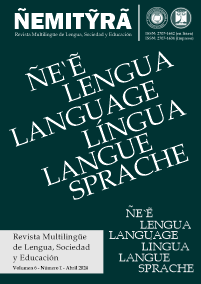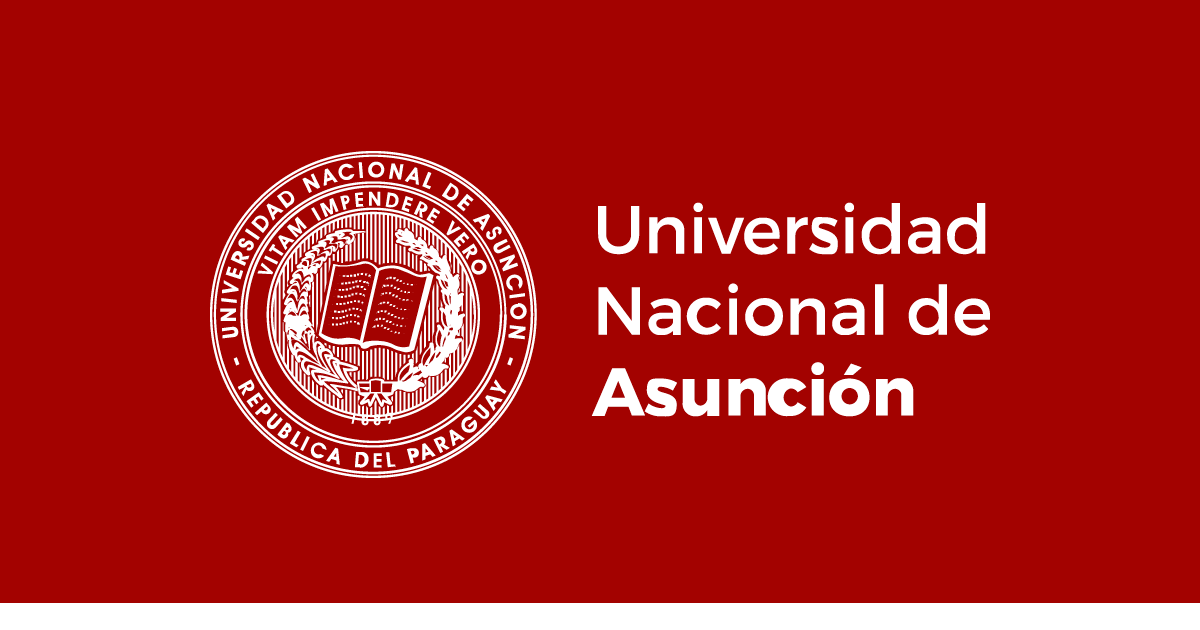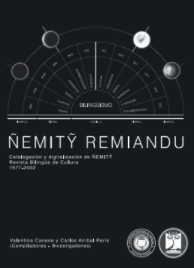"To be the person who is not the native speaker". Interculturality as empathy in cross-cultural experiences abroad
DOI:
https://doi.org/10.47133/NEMITYRA20240601-A2Palabras clave:
Cross-cultural experience, study-abroad, cultural empathy, interculturality, communicative competenceResumen
While inter/cross-cultural learning continues as a paramount and central topic of discussion in the foreign language teaching, the current debate on intercultural communicative competence as a goal for cross-cultural experiences has gained complexity as a result of critical considerations on interculturality and language learning. Although the literature on intercultural learning is long and verbose within the scope of study-abroad, there is still much to see and explore in the lived experience of sojourners to comprehend intercultural experiences and language learning/teaching practices abroad. This qualitative case study examined 32 students’ reflective essays with Atlas.ti for text mining and codification. Results suggest that empathy was the most salient feature to understand language, people, and culture. The lived experience of the person who is not a native speaker helped Lee University students to put themselves in someone else's position. In this vein, the role of language was pivotal to engage in the resignification of differences/similarities between cultures. This study contributes to the growing literature on the power of cross-cultural experiences for internationalization and decolonization.
Referencias
Andawi, D. A., Ngadiso., & Drajati, N. A. (2019). Self-reflection of attitude after teaching abroad: A narrative of teaching Indonesian to American students. Humaniora, 10(1), 55-62. doi: https://doi.org/10.21512/humaniora.v10i1.5284
Anderson-Levitt, K. M. (2017). Complicating the concept of culture. In Schriewer, J. (Ed.) World Culture Re-Contextualised (pp. 45-58). Michigan: Routledge.
Appe, S., Rubaii, N., & Stamp, K. (2016). Advancing global cultural competencies in public affairs education: A baseline study of international service learning within NASPAA member programs. Journal of Public Affairs Education, 22(1), 67-90.
Aronson, B. A. (2017). The white savior industrial complex: A cultural studies analysis of a teacher educator, savior film, and future teachers. Journal of Critical Thought and Praxis, 6(3). doi: https://doi.org/10.31274/jctp-180810-83
Ashdown, B. K., & Buck, M. (2018). International aid as modern imperialism—What does cross-cultural psychology really have to offer? A commentary on “the positive role of culture: what cross-cultural psychology has to offer to developmental aid effectiveness research, by Symen A. Brouwers.” Journal of Cross-Cultural Psychology, 49(4), 545–553. doi: https://doi.org/10.1177/0022022118768428
Aski, J. M., & Weintritt, A. D. (2020). New messaging and intercultural competence training in response to falling enrollments in world languages. Italica, 97(1), 134–154. https://www.jstor.org/stable/48619028
Bakir, A., Wickens, E., Boluk, K., & Avgeli, V. (2017). Cross-cultural issues in tourism and hospitality. Tourism and Hospitality Research, 17(3), 245–248. doi: https://doi.org/10.1177/1467358416653868
Bell, L.A. (2013, December 29). Empathy: A short conceptual history and an anthropological question. Blog Savage Minds. Retrieved from Empathy: A Short Conceptual History and An Anthropological Question | Savage Minds
Bican, G. (2021). Enhancing the Cross-Cultural Competence of Prospective Language Teachers. Journal of Curriculum and Teaching, 10(3), 47-57. doi: https://doi.org/10.5430/jct.v10n3p47
Birindelli, P. (2023). The experience of international students: biographical narratives and identities. Society, 1-16. doi:https://doi.org/10.1007/s12115-023-00809-0
Bleakley, A. (2020). Educating doctors' senses through the medical humanities: “How do I look?". New York: Routledge.
Bleakley, A., Bligh, J., & Browne, J. (2011). Medical education for the future: Identity, power and location (Vol. 1). Plymouth: Springer Science & Business Media.
Chédru, M., & Delhoume, C. (2023). How does studying abroad affect engineering students' intercultural competence: A longitudinal case study. European Journal of Engineering Education, 1-16. doi: https://doi.org/10.1080/03043797.2023.2171853
Coleman, N., & Guntersdorfer, I. (2019). Intercultural competence for global German studies. Die Unterrichtspraxis/Teaching German, 52(2), 138-145. doi: https://doi.org/10.1111/tger.12096
Conner, N. W., & Roberts, T. G. (2017). A qualitative case study of the cultural experiences of undergraduates on a study abroad program in Costa Rica. NACTA Journal, 61(2), 141–149. https://www.jstor.org/stable/90021195
Cooper, C., DelliCarpini, D., Fyfe, D., & Nguyen, A. (2021). Designing study abroad with empathy and engagement: a case study for project-based global learning experiences. In G. Malfatti (Ed.), People-Centered approaches toward the internationalization of higher education (pp. 168-191). IGI Global. doi: https://doi.org/10.4018/978-1-7998-3796-1.ch009
Denzin, N. K., & Lincoln, Y. S. (Eds.). (2011). The Sage handbook of qualitative research. Thousand Oaks: CA Sage.
Diaconu, M., Racovita-Szilagyi, L., & Neacsu, A. (2018). International service-learning trips: A framework for developing cross-cultural competence. J. Soc. & Soc. Welfare, 45, 115. doi: https://doi.org/10.15453/0191-5096.4170
Doerr, N. M. (2022). Transforming study abroad: A handbook. New York: Berghahn Books.
Dutkiewicz, K., & Dutkiewicz, D. (2020). Transforming conventional short-term, faculty-led study-abroad programs into broader platforms for increased community engagement and internationalization. In P. Crawford & B. Berquist (Eds.), Community engagement abroad: perspectives and practices on service, engagement, and learning overseas (pp. 29–50). Michigan State University Press. doi: https://doi.org/10.14321/j.ctvthhcqg.6
Eichbaum, Q., Barbeau-Meunier, C. A., White, M., Ravi, R., Grant, E., Riess, H., & Bleakley, A. (2022). Empathy across cultures–one size does not fit all: from the ego-logical to the eco-logical of relational empathy. Advances. Health Sciences Education, 1-15.doi: https://doi.org/10.1007/s10459-022-10158-y
Geeslin, K. L., & Garrett, J. (2018). Variationist research methods and the analysis of second language data in the study abroad context. In Sanz, C. & Morales-Front, A. (Eds.), The Routledge handbook of study abroad research and practice (pp. 17-35). New York: Routledge. doi: https://doi.org/10.4324/9781315639970
Hoff, H. E. (2020). The evolution of intercultural communicative competence: Conceptualisations, critiques and consequences for 21st century classroom practice. Intercultural Communication Education, 3(2), 55-74. doi: https://doi.org/10.29140/ice.v3n2.264
Hull, A. (2018). A reflection on cross-cultural competencies: How attitudes shaped experience in rural India. The Journal of Educational Thought (JET) / Revue de La Pensée Éducative, 51(3), 281–296. doi: https://www.jstor.org/stable/26873074
Kinginger, C. & Zhuang, J. (2023). 5 Quests for Identity. In The Professional Lives of Language Study Abroad Alumni: A Mixed Methods Investigation (pp. 102-123). Bristol, Blue Ridge Summit: Multilingual Matters. doi:https://doi.org/10.21832/9781800412514-008
Krznaric, R. (2014). Empathy: A handbook for revolution. Rider.
Lentz, C. (2017). Culture: the making, unmaking and remaking of an anthropological concept. Zeitschrift Für Ethnologie, 142(2), 181–204. https://www.jstor.org/stable/26607020
Maharaja, G. (2018). The Impact of study abroad on college students' intercultural competence and personal development. International Research and Review, 7(2), 18-41. https://files.eric.ed.gov/fulltext/EJ1188735.pdf
Mapes, J. (2020). Development of intercultural competence and cultural empathy in high school students participating in a short-term study abroad exchange (Doctoral dissertation, West Chester University). https://digitalcommons.wcupa.edu/all_doctoral/77
McCormick, T. (2018). Psycholinguistic, cognitive, and usage-based approaches to study abroad research. In Sanz, C. & Morales-Front, A. (Eds.), The Routledge handbook of study abroad research and practice (pp. 36-46). New York: Routledge. doi: https://doi.org/10.4324/9781315639970
McIntosh, A. J., Hinch, T., & Ingram, T. (2002). Cultural identity and tourism. International Journal of Arts Management, 39-49.
Moradi, E., & Ghabanchi, Z. (2019). Intercultural sensitivity: A comparative study among business English undergraduate learners in two countries of Iran and China. Journal of Ethnic and Cultural Studies, 6(3), 134–146. doi: https://doi.org/10.29333/ejecs/278
Nelson, W., & Luetz, J. M. (2021). The impact of short-term cross-cultural experience on the intercultural competence of participating students: A case study of Australian high school students. Social Sciences, 10(8), 313. doi: https://doi.org/10.3390/socsci10080313
Nordmeyer, K., Bedera, N., & Teig, T. (2016). Ending white saviorism in study abroad. Contexts, 15(4), 78–79. doi: https://doi.org/10.1177/1536504216685131
Peckenpaugh, K. M. (2018). Unpacking the study abroad experience: An intercultural process. In Sanz, C. & Morales-Front, A. (Eds.), The Routledge handbook of study abroad research and practice (pp. 475-489). New York: Routledge.
Peel, K. L. (2020). A beginner's guide to applied educational research using thematic analysis. Practical Assessment, Research, and Evaluation, 25(2). doi: https://doi.org/10.7275/ryr5-k983
Qinhui Huang, Cheung, A.C., & Qianying Xuan (2023). The impact of study abroad on pre-service and in-service teachers’ intercultural competence: A meta-analysis. Teaching and Teacher Education, 1(127). doi: https://doi.org/10.1016/j.tate.2023.104091.
Reiter, A. L. (2023). Forming a global citizen: personal development through study abroad. (Honors thesis, University of South Dakota). https://red.library.usd.edu/honors-thesis/293
Root, E., & Ngampornchai, A. (2013). “I came back as a new human being”: Student descriptions of intercultural competence acquired through education abroad experiences. Journal of Studies in International Education, 17(5), 513–532. doi: https://doi.org/10.1177/1028315312468008
Sanz, C. & Morales-Front, A. (Eds.). (2018). The Routledge handbook of study abroad research and practice (1st ed.). New York: Routledge. doi: https://doi.org/10.4324/9781315639970
Smolcic, E., Martin, D. (2019). Cultural/Linguistic Immersion in Teacher Preparation for Emergent Bilingual Learners: Defining a New Space for Asset-Based Pedagogies. In: Martin, D., Smolcic, E. (eds) Redefining Teaching Competence through Immersive Programs. Palgrave Macmillan, Cham. https://doi.org/10.1007/978-3-030-24788-1_1
Soto Molina, J., & Méndez Rivera, P. E. (2022). Decolonial approach to the intercultural bilingual curriculum: from theory to practice. Revista Interamericana De Investigación Educación y Pedagogía RIIEP, 15(1). doi: https://doi.org/10.15332/25005421.6352
Soto-Molina, J. E., & Méndez, P. (2020). Linguistic Colonialism in the English Language Textbooks of Multinational Publishing Houses. HOW, 27(1), 11–28. doi: https://doi.org/10.19183/how.27.1.521
Steele, J. L., Slater, R. O., Zamarro, G., Miller, T., Li, J., Burkhauser, S., & Bacon, M. (2017). Effects of dual-language immersion programs on student achievement: evidence from lottery data. American Educational Research Journal, 54(1_suppl), 282S-306S. doi: https://doi.org/10.3102/0002831216634463
Stein, S., & McCartney, D. M. (2021). Emerging Conversations in Critical Internationalization Studies. Journal of International Students, 11(S1), 1–14. doi: https://doi.org/10.32674/jis.v11iS1.3840
Tazheva, Z., Sycheva, I., y Artyukhova, N. (2021). Formation of cross-cultural communicative competence among foreign students during pre-university training. Propósitos Y Representaciones, 9(SPE2), e1024. doi: https://doi.org/10.20511/pyr2021.v9nSPE2.1024
Terzuolo, E. R. (2016). Intercultural development and study abroad: impact of student and program characteristics (Doctoral dissertation, The George Washington University). ProQuest Dissertations Publishing. https://www.proquest.com/docview/1766586284?pq-origsite=gscholar
Tullock, B. (2018). Identity and study abroad. In Sanz, C. & Morales-Front, A. (Eds.), The Routledge handbook of study abroad research and practice (pp. 261-274). New York: Routledge.
Yin, R. K. (2018). Case Study Research and Applications: Design and Methods (6th ed.). Thousand Oaks, CA: Sage.
Zhu, H. (2011). From intercultural awareness to intercultural empathy. English Language Teaching, 4(1), 116-119.
Publicado
Número
Sección
Licencia
Derechos de autor 2024 Alexander Steffanell; Pilar Méndez-Rivera; y Revista Ñemitỹrã

Esta obra está bajo una licencia internacional Creative Commons Atribución 4.0.










